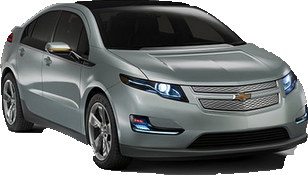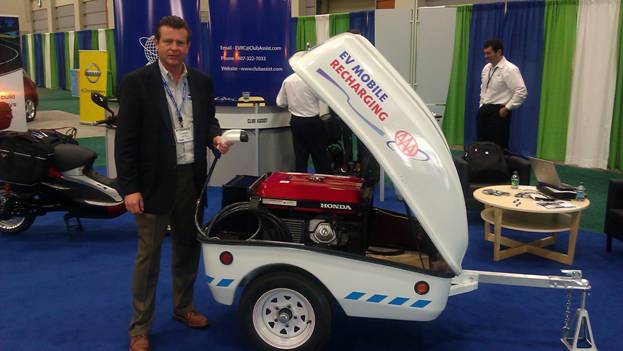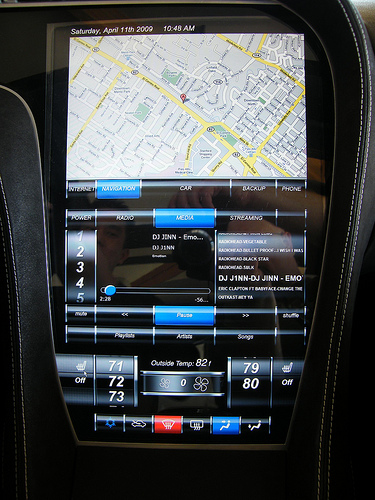|
|
|
|
|
|
|
|
||||||||||||||||||||||||||||||||||||||||||||||
FACTS ABOUT ELECTRIC CARS
December, 2012
|
I've wanted an electric car since the late 1990's, and in 2010 it started to look like EV's were going to become a reality. So, I began doing a lot of research on the subject, and I was originally intent on buying a Tesla Roadster, but in the end I ended up buying a Fisker Karma. It seems that there is a whole lot of misinformation out there about electric cars partly because of ignorance by the nay-sayers, and partly because of misinformation by the people manufacturing the cars. This web page is dedicated to clearing up some things, and hopefully providing some useful information. DEFINITIONSEV - Electric Vehicle: These are pure electric cars with no gas engine at all. They run entirely on battery power, and when the battery dies the car comes to a halt. Examples are the Nissan Leaf and the Tesla Roadster or Model S.
PHEV - Plug-in Hybrid Electric Vehicle: In the strictest sense these are cars that run on both batteries and a gas engine. The gas engine is connected to the drive train and will supply power to the wheels when the battery runs out. The Chevy Volt is such a car.
EV + Range Extender: These are very similar to PHEV's (and are often still referred to as such) in that they have both a gas and electric motor. In this case, however, the the gas engine never drives the wheels of the car. The car is a true EV, not a hybrid, but there is a Range Extending gas generator to charge the battery so that the car isn't stranded when the battery runs out. The Fisker Karma is an example of this, and they call it an EVER - Electric Vehicle Extended Range.
FACT #1: ELECTRIC CARS DON'T SAVE YOU MONEY... YETAt least not yet. Nobody buys an electric car because they want to save money. Quite the opposite: electric cars cost quite a bit more to purchase and run than equivalent gas cars. The only valid reasons for buying an electric car are 1) because you want to reduce your CO2 output, 2) you don't want to send any more money to Saudi Arabia, and 3) they're cool! It is true that an electric car costs around $0.05 per mile in electricity to operate versus a SUV which might cost $0.17 in gas per mile, but that's not the whole picture. You have to remember that the battery itself is a consumable item, and most Lithium Ion batteries are only good for 100,000 miles. Take the case of the Tesla Roadster: that battery currently costs around $30,000 which means that when you buy a Tesla you're paying for $30k worth of battery, and that comes out to an additional $0.30 per mile of operating costs! That's also assuming you let the battery go the full 100,000 miles, but many people will need to replace theirs sooner. A Tesla will cost you almost twice as much per mile to operate as a gas-guzzling SUV! The Chevy Volt's battery pack costs around $8,000 which is a lot better, but it still adds about $0.08 per mile for a total of around $0.13 per mile. The similar 2011 Chevy Malibu which gets 33mpg will cost only around $0.12 per mile @ $4/gallon gas. Electric cars do not save you money... yet. Eventually the price of batteries will come down and then EV's will be more cost effective than gas, but we're still many years away from that. There are some promising battery technologies on the horizon which will revolutionize electric cars. The lithium-air batteries that are being researched could give 10x the energy density of current Li-Ion batteries - the equivalent energy density as gasoline.
FACT #2: ELECTRIC CARS POLLUTE LESS?Critics who are totally ignorant on the subject claim that electric cars pollute just as much because the electricity has to come from somewhere, and it's usually from coal-fired power plants. Even if 100% of our electricity came from coal power plants it would still result in far less pollution compared with everyone having their own gas powered engine in their cars. The truth is that it is far more efficient to generate large-scale power from a single power station than from 500,000 individual internal combustion engines. Additionally, much of our electricity comes from nuclear, hydro, wind, nuclear, and solar sources which are clean. Here in Texas it looked like this for 2010:
Also keep in mind that electric cars keep the pollution that is produced out of cities. Power plants are generally located in remote areas, so our cities would be cleaner with electric vehicles. It can be argued, however, that if everyone suddenly switched to EV's that the strain on the power grid would cause major issues. Well, if everyone recharged at night that actually wouldn't be an issue, but during the day it could, yes.
FACT #3: ELECTRIC CARS STILL REQUIRE MAINTENANCEThe EV industry would have you believe that electric cars never break down and they don't require any maintenance. This is totally false! EV's require less maintenance, yes, and in some cases there are fewer parts to break, but EV's are still incredibly complex machines, and regular maintenance is still needed. You don't need to do an oil change every 5,000 miles, but you do still need to rotate the tires, replace the A/C air filters, check the brake pads, get firmware updates, deal with recalls, etc. It is important to remember that an electric car still has all of the basic parts of a regular car such as an A/C, electric windows, breaks, computer systems, radio, etc., and the truth is that those are the things that tend to break on cars long before there are any major drivetrain issues. Here is a list of everything I can remember ever breaking on any of my cars:
In the first 3 months that I had my Fisker Karma it had more malfunctions and issues than any gas car I've ever owned. So, you can still expect your EV to break and need fixing, maybe just not as often as with a regular car. However, if you get a PHEV which still has a gas engine in it then you're still subject to most of the drivetrain issues. The oil will need changing, the radiator still might leak, etc. About the only thing you never have to worry about in a PHEV is the transmission since current electric vehicles don't have one - or at least what they have is just a single gear speed. Even if you never use the gas engine in your PHEV, you'll still have to take it in for an oil change and service annually. It's actually worse for an engine to sit idle than to be used, so all gas engines require annual maintenance regardless of usage. When I was looking at buying a Tesla Roadster, the sales guy kept telling me how there were no fluids in the car other than the windshield wiper fluid. But then he'd tell me about how the battery pack was liquid cooled and each battery cell was bathed in the fluid. Err... ok. Contradiction?
FACT #4: ELECTRIC CARS ARE SLOW, BUT QUICKLet's be clear on the difference between speed and quickness. A car is "quick" if its 0-60 time is short, and a car is "fast" if it has a high top speed. That being defined, EV's are slow - top speeds are well below what gas equivalent cars typically do. For example, the top speed of the Fisker Karma in stealth mode is only a pathetic 95mph, and even the Tesla Roadster has a top speed of only 125mph. Neither of those cars can be called "fast" by today's standards. However, most electric cars are extremely quick! EV 0-60 times are very impressive, and if it were not for the massive weight of the batteries they'd blow away even the best 12-cylinder supercars. The Tesla Roadster may not be fast, but it is crazy-quick with a 0-60 time of just 3.7 seconds. The much larger and heavier Fisker Karma can do it in 6.3 seconds. Once the weight of EV batteries gets reduced those 0-60 times should skyrocket. The main reason that electric cars have such poor top speeds is because they lack gear boxes. It's like running a gas car in 2nd gear the whole time - you can only go so fast no matter how big your engine is. The electric motors have tons of horsepower and torque (the Karma has 403hp and a mind-blowing 960 ft-lb of torque), but there's no way to deliver that power once the electric motor reaches its maximum RPM. Most cars have no need to go faster than 95mph, but in the future it is likely that electric sports cars will have some sort of 2 or 3 gear transmission which will allow the cars to easily exceed 200mph. Today, only exotic supercars can reach such speeds, but in the future 200mph capabilities will be inexpensive and common.
FACT #5: EV'S HAVE RANGE ISSUES, PHEV'S DO NOTPure EV's with no gas backup suffer from range anxiety. Even the Tesla Roadster with 300 miles of battery range is no good for a road trip because it only gives you 150 miles each way, and that's assuming perfect conditions. You'll get 300 miles on a brand new battery, fully charged, if nothing else is on, and you drive like grandma. The A/C in an electric car drains about 14% of the battery, so that's 42 miles lost right there. The typical Li-ion battery pack loses about 5% of its capacity every year which is why they say they only have a 10 year / 100,000 mile life. After 10 years your battery will have only 50% of the charge capacity that it did when it was new. So, if your Tesla is just 3 years old then you've already lost 45 miles of range on it. Another factor than affects Li-ion batteries is temperature. In cold winter climates the batteries lose their charge faster, so range is reduced in those cases as well. Not to mention that you'll have the seat warmers and heater on full-blast too. Headlights, the stereo, power steering, and all sorts of other things contribute to energy usage. Pure EV's are good city commuter cars, but you'll need a 2nd gas powered car in the garage for anything else. PHEV's are a different story, however. These cars typically have less pure electric range than EV's, but since the backup engine runs on gas you can drive clear across the country without any range anxiety at all. It will defeat the purpose of having an electric car in the first place, but at least you won't get stranded. Even when running on just the gas generator, the Fisker Karma still gets a reasonable 26mpg.
FACT #6: ELECTRIC CARS ARE COOL!That's one of the main reasons for getting one, right? They're almost completely silent, so you can thrash on the accelerator without ticking off the cops or your neighbors, and the instant torque sensation and lack of gear changes really makes for a unique driving experience. Companies making electric cars are also putting a lot of other neat technologies into the cars. For example, the Tesla Model S has a giant touchscreen that's wicked-cool (and cluttered)!
The Fisker Karma has a giant solar panel on the roof, and while it doesn't really provide any power to the wheels, it does provide 120 watts of power to keep the car cool while it's parked in a hot parking log.
FACT #7: THERE ARE GOVERNMENT INCENTIVESThis is the one thing that helps take the sting out of the price of buying an electric car. Along with efiling, currently, in the US, there is a Federal tax rebate of up to $7,500 on EV's and PHEV's. The Feds will also pay for 30% of the cost of installing a Level 2 charging station, and many states and cities have additional rebates and incentives. Some let you drive in the carpool lanes w/o having passengers. Some give free parking, etc.
CONCLUSION & SUMMARYElectric cars are a viable form of transportation. You have to be ready to pay more (much more) than a regular car, but you get the peace of mind knowing that you are doing the right thing. You're helping the planet and you're not sending money to Saudi Arabia. You still have to perform regular maintenance, but it should cost less than what a petrol powered car costs to maintain. Electric cars are the future, but the battery technology has a lot of room for improvement. They outperform gas engines, and they do so silently. If you can afford it then consider being a trend setter! |
|||||||||||||||||||||||||||
|
|
|
|
|
|
|
|
||||||||||||||||||||||||||||||
©2001-2011 Brian Greenstone









